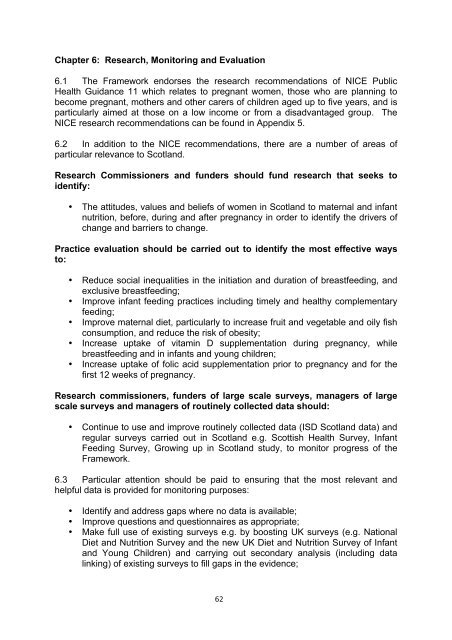Improving Maternal and Infant Nutrition: A Framework for Action
Improving Maternal and Infant Nutrition: A Framework for Action
Improving Maternal and Infant Nutrition: A Framework for Action
Create successful ePaper yourself
Turn your PDF publications into a flip-book with our unique Google optimized e-Paper software.
Chapter 6: Research, Monitoring <strong>and</strong> Evaluation6.1 The <strong>Framework</strong> endorses the research recommendations of NICE PublicHealth Guidance 11 which relates to pregnant women, those who are planning tobecome pregnant, mothers <strong>and</strong> other carers of children aged up to five years, <strong>and</strong> isparticularly aimed at those on a low income or from a disadvantaged group. TheNICE research recommendations can be found in Appendix 5.6.2 In addition to the NICE recommendations, there are a number of areas ofparticular relevance to Scotl<strong>and</strong>.Research Commissioners <strong>and</strong> funders should fund research that seeks toidentify:• The attitudes, values <strong>and</strong> beliefs of women in Scotl<strong>and</strong> to maternal <strong>and</strong> infantnutrition, be<strong>for</strong>e, during <strong>and</strong> after pregnancy in order to identify the drivers ofchange <strong>and</strong> barriers to change.Practice evaluation should be carried out to identify the most effective waysto:• Reduce social inequalities in the initiation <strong>and</strong> duration of breastfeeding, <strong>and</strong>exclusive breastfeeding;• Improve infant feeding practices including timely <strong>and</strong> healthy complementaryfeeding;• Improve maternal diet, particularly to increase fruit <strong>and</strong> vegetable <strong>and</strong> oily fishconsumption, <strong>and</strong> reduce the risk of obesity;• Increase uptake of vitamin D supplementation during pregnancy, whilebreastfeeding <strong>and</strong> in infants <strong>and</strong> young children;• Increase uptake of folic acid supplementation prior to pregnancy <strong>and</strong> <strong>for</strong> thefirst 12 weeks of pregnancy.Research commissioners, funders of large scale surveys, managers of largescale surveys <strong>and</strong> managers of routinely collected data should:• Continue to use <strong>and</strong> improve routinely collected data (ISD Scotl<strong>and</strong> data) <strong>and</strong>regular surveys carried out in Scotl<strong>and</strong> e.g. Scottish Health Survey, <strong>Infant</strong>Feeding Survey, Growing up in Scotl<strong>and</strong> study, to monitor progress of the<strong>Framework</strong>.6.3 Particular attention should be paid to ensuring that the most relevant <strong>and</strong>helpful data is provided <strong>for</strong> monitoring purposes:• Identify <strong>and</strong> address gaps where no data is available;• Improve questions <strong>and</strong> questionnaires as appropriate;• Make full use of existing surveys e.g. by boosting UK surveys (e.g. NationalDiet <strong>and</strong> <strong>Nutrition</strong> Survey <strong>and</strong> the new UK Diet <strong>and</strong> <strong>Nutrition</strong> Survey of <strong>Infant</strong><strong>and</strong> Young Children) <strong>and</strong> carrying out secondary analysis (including datalinking) of existing surveys to fill gaps in the evidence;
















